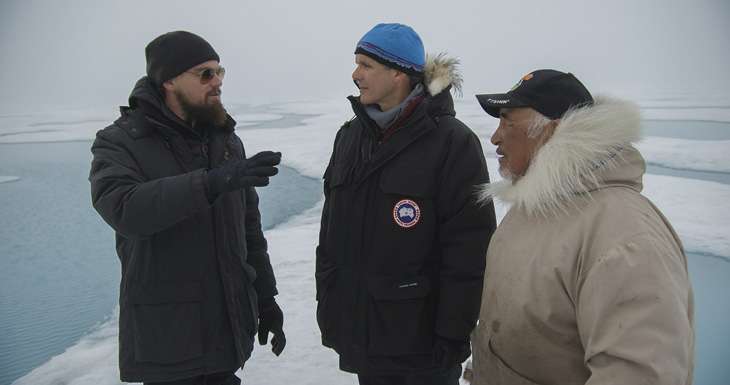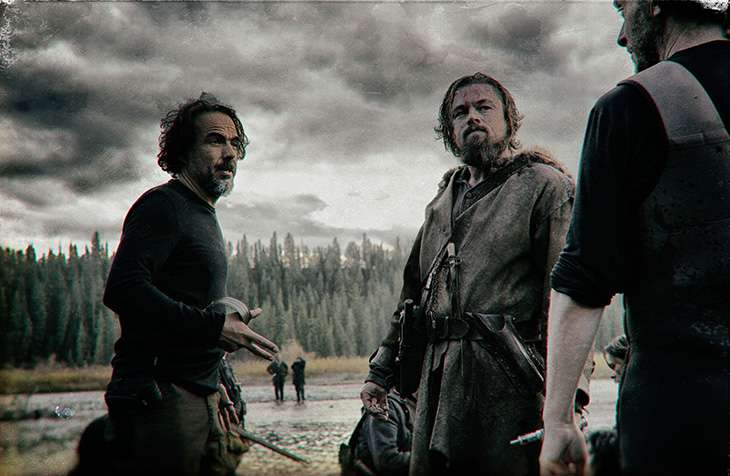Before the Flood review: DiCaprio spells out the horrors of climate change

Climate change is real, as opposed to what many a Donald Trump supporter may think. But that disbelief is not limited only to the crazies who'd like to see the corrupt businessman as President of the US.
Around the world, you'll come across millions who believe that climate change is a liberal myth, designed to hit out at capitalism and industry.
But cold hard facts and science back climate change - it really isn't a figment of imagination. More than anything, it's terrifying.
We're at a point where we're leaving our future generations almost nothing. Terrains have eroded away and changed drastically, becoming uninhabitable. The ice caps are melting and water levels are rising drastically. Animal and bird species around the world are becoming extinct. Pollution levels across the world have spiked - New Delhi's air after Diwali feels like you're wading through particulate toxic sludge.
An urgent call to arms about climate change, National Geographic's Before the Flood highlights many of these changes that our earth is undergoing because of mankind's ways.

DiCaprio front and centre
Putting Leonardo DiCaprio, who produced the documentary, at the centre is a smart move; his global star power is and always was more likely to get the documentary eyeballs. It also makes this the most significant documentary about climate change since Al Gore's An Inconvenient Truth was released a decade ago.
Toward the same goal, National Geographic screened it on its TV channel on 30 October, and released it on YouTube the very same day, with the idea that this was made for mass consumption - that educating more people is more important than making money off such a project.
Also read - Looming catastrophe: climate change to claim 1.3 lakh lives in India in 2050
We should be hopeful that it would be effective in that respect, because at the end of the day, our first and only line of defence is an informed public that actually wants to change the drastic direction we've been heading down.
Simplistic solutions
For the movie, DiCaprio spent three years interviewing people around the world about local and regional challenges, as well as the options for addressing those.
The movie does not focus on simply showing how terrible the current state of affairs is. It also focusses on the positive solutions many across the globe have taken.
DiCaprio is no expert, he makes that clear with comments like: "Oh wait, that's how much ice has melted!" repeated with awe over three times.
But what's worse, he and the movie only offer simplistic solutions. The whole documentary shows far too much faith in investment in renewable energy being our saviour, in politicians deciding to make the right decision.
Which, considering how well acquainted we are with human greed at the moment, isn't likely to happen.
DiCaprio's meeting with Sunita Narain, director of India's Centre for Science and Environment, provides, arguably, the key scene of the whole film. They discuss the sweet spot of the climate conundrum: how do developing nations with fast-rising populations raise standards of living for all without emitting vast volumes of greenhouse gases by the burning of fossil fuels?
Even Narain shakes her head woefully at the actor when he cheerfully spells out how to fix the present state of affairs. That's before she proceeds to give him a dressing down on just how much the average US citizen consumes as compared to the rest of the world.
Thanks to her comments, DiCaprio is forced to look back at his own lifestyle. He doesn't hide the fact that he has a larger carbon footprint that the average person, thanks to his jet-setting ways.
The actor, who Al Gore took under his wing in 1998, has been quoted time and again as saying that the fossil fuel industry should be "taxed out of existence" - which many have seen as a rather ironic suggestion, since it is fossil fuels have enabled him to zip around the world to attend environmentally-themed parties or lecture world leaders on how to address the climate crisis.
There's even a segment where he's seen on the sets of The Revenant, the Alejandro G Inarritu movie that won DiCaprio the Oscar last year. The production was forced to move from Canada to Argentina near the South Pole, just in order to find snow to finish filming.

An ugly present and future
Directed by Oscar-winning Fisher Stevens (The Cove), the movie touches many bases, but particularly, the influence of corporate money into politics.
Beyond that, DiCaprio travels the globe to see how other countries are handling climate change, with the goal of getting a first-hand account of the effects of climate change on communities, which could very well be a preview of much worse things to come.
We see how the nature-loving people of Kiribati are forced to bear the negative results of the world's excesses. Kiribati became the first country in 2014 to officially ask for the status of "climate refugees" for its citizens.
We see first-hand how Greenland's melting ice is causing a change in the colour of its terrain. This means it no longer reflects the sun but absorbs it, becoming a heat creator.
Also read - Earth day: The 10 nations most affected by climate change
We see how it has become necessary for Florida to literally raise the elevation of roads in Miami Beach, to combat rising ocean waters.
We see how all bills in the US Congress are blocked because of Congressmen who are funded by fuel companies.
We see how business houses like Exxon, the Koch brothers and even Doritos, continue to constantly seek cost-cutting measures, that in turn hurt the environment exponentially, in their bid to make more money. We see tar sands in Canada, which look "like Mordor", as DiCaprio puts it.
We see how climate change scientists are vilified and targeted. It is disbelief that is underlined throughout, scientists are discredited, sent hate letters and publicly humiliated. Most of it can be traced back to fossil fuel interests.
The message
The message is sincere, but more likely than not, the content will scare anyone away from making a positive change, as the future already looks so bleak.
The original score, by veterans like Trent Reznor, Atticus Ross, Mogwai, and Gustavo Santaolalla, is terrific, and adds to that sense of responsibility that we all must bear.
Even so, we've known about the problem for decades, but mostly ignored it. This movie isn't likely to change too much, but perhaps it can change the minds of at least some non-believers out there, so they can do their small bits to help soften the blow.
But in the end, we will and should be judged by what we leave behind.
More in Catch - World Environment Day: time to wake up and smell the climate change coffee
Why Brexit is bad news for climate change
First published: 3 November 2016, 10:49 IST






![BJP's Kapil Mishra recreates Shankar Mahadevan’s ‘Breathless’ song to highlight Delhi pollution [WATCH] BJP's Kapil Mishra recreates Shankar Mahadevan’s ‘Breathless’ song to highlight Delhi pollution [WATCH]](https://images.catchnews.com/upload/2022/11/03/kapil-mishra_240884_300x172.png)

![Anupam Kher shares pictures of his toned body on 67th birthday [MUST SEE] Anupam Kher shares pictures of his toned body on 67th birthday [MUST SEE]](https://images.catchnews.com/upload/2022/03/07/Anupam_kher_231145_300x172.jpg)






